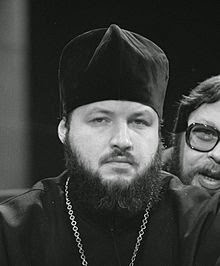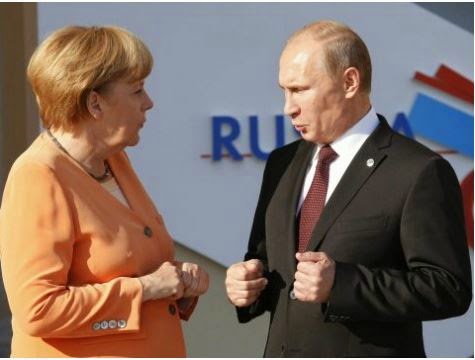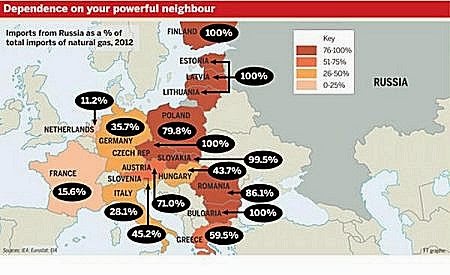"Russian President Vladimir Putin's diplomatic blitz on Ukraine got off to a rocky start Thursday when he kept German Chancellor Angela Merkel waiting for a meeting then showed up in the middle of a dinner with European and Asian leaders."
That initial meeting between Putin and Merkel was cancelled, but then it transpires that the two had a meeting deep into the night over the crisis in Ukraine.
 |
| Putin and Merkel in Milan on Thursday 16 October 2014 |
 |
| Merkel and Poroshenko in Italy |
 |
| Putin, Poroshenko, and others meeting in Milan |
Yet again Putin's supporters at that meeting i.e. Merkel, Renzi and Van Rompuy are, like Putin, pushing his agenda that has come to be known as the Minsk Agreement. As I stated on 18th September,
"Key points of this Minsk memorandum include:
- To pull heavy weaponry 15km by each side from the line of contact, creating a 30km security zone
- To ban offensive operations
- To ban flights by combat aircraft over the security zone
- To set up an OSCE monitoring mission
- To withdraw all foreign mercenaries from the conflict zone
Let us also be reminded of who attended this Minsk meeting:
- Swiss diplomat and OSCE representative Heidi Tagliavini
- Former president of Ukraine and Ukrainian representative Leonid Kuchma
- Russian Ambassador to Ukraine and Russian representative Mikhail Zurabov
- Russia's proxies in Eastern Ukraine DPR and LPR leaders Aleksandr Zakharchenko and Ihor Plotnytskiv
With the exception of Heidi Tagliavini (a Swiss diplomat), this was a meeting rubber-stamping Putin's agenda and attended by those who feared him (Kuchma), depended on his patronage (Mikhail Zurabov), and his Russian criminal cohorts disguised as 'leaders' in eastern Ukraine (Zakharchenko and Plotyntskiv).
Now it only remains to be seen what falls out from that "deep into the night" meeting betweeen Merkel and Putin (16 into 17 October 2014). Let us also not forget that, "... on 31st July 2014, it emerged that Putin and Merkel had secret talks that conceded Crimea to Russia in exchange for ending the war between Ukraine and Russia. And yet the war in eastern Ukraine continues, (October 18 2014) notwithstanding Putin's Minsk Agenda.
Whilst all these meetings were happening in Milan, Putin had something of a headache to contend with. On the same day (17 October) that he met all those leaders for a "breakfast" meeting, the price of oil continued on its downward spiral. Given the 'one trick' energy-exporting nature of Russia's economy, Putin was somewhat apocalyptic about the effects that this fall in the price of oil could have on the world economy. As Tomas Hirst points out,
"Vladimir Putin said Friday that the global economy would collapse if the oil price was allowed to remain at around $80 a barrel for too long.
At a press conference following talks on the Ukrainian crisis in Milan, Italy the Russian president warned that prices as low as $80 a barrel would cause US oil production to crash as well as putting pressure on the rest of the global economy."
The decline in oil prices may be depriving Russian President Vladimir Putin of his biggest ally..."
Even more disconcerting, as Pavel Koshin points out,
".. if oil prices drop to $87 per barrel and the dollar-ruble exchange rate trades as high as 40 in 2015. In such a scenario, Russia would have to use money from its Reserve Fund, which comprises about $90 billion, he announced at the Oct. 13 session of the State Duma, the lower chamber of the Russian parliament.
All of these recent developments have spurred the growth of numerous conspiracy theories among the Russian elites and led to a certain amount of consternation. They have also made Russian policymakers reassess their economic policy."
Russia, already awash with 'conspiracy' theories about the war they are having with Ukraine, now has a 'new' conspiracy actor on the stage viz. the price of oil. Just how many 'conspiracy' theories can the Kremlin invent without becoming a hostage to its own conspiracies? If the myth that there is no Russian soldiers actively engaging in a war in eastern Ukraine has taken such a powerful hold on the mind of the ordinary Russian citizen, what will the Kremlin myth that Obama and Saudi Arabia are trying to bring Russia to its knees by forcing the oil price to collapse do to the minds of the Russian people?
(to be continued)

































